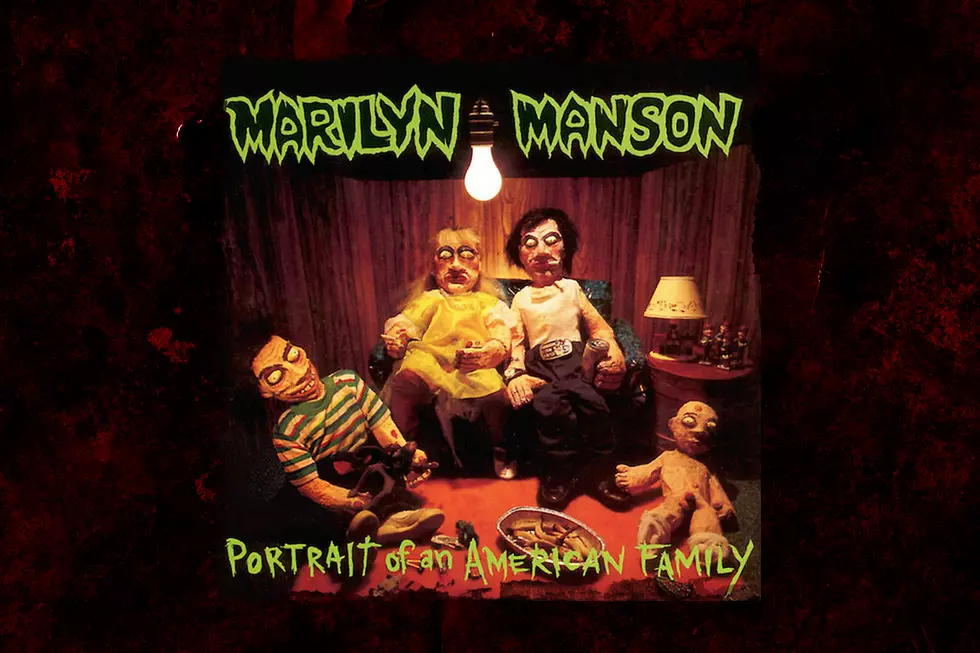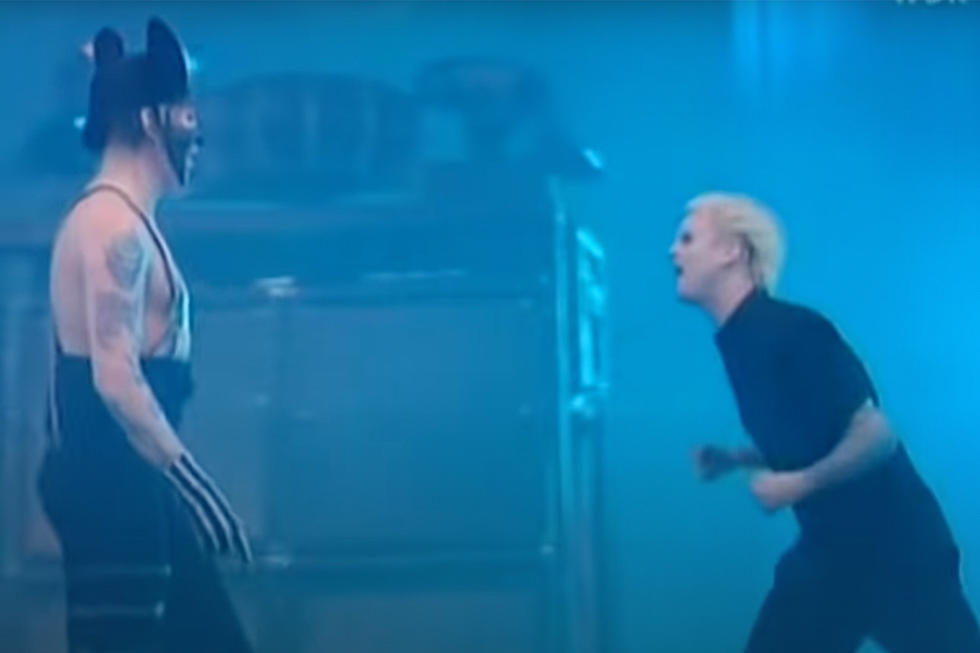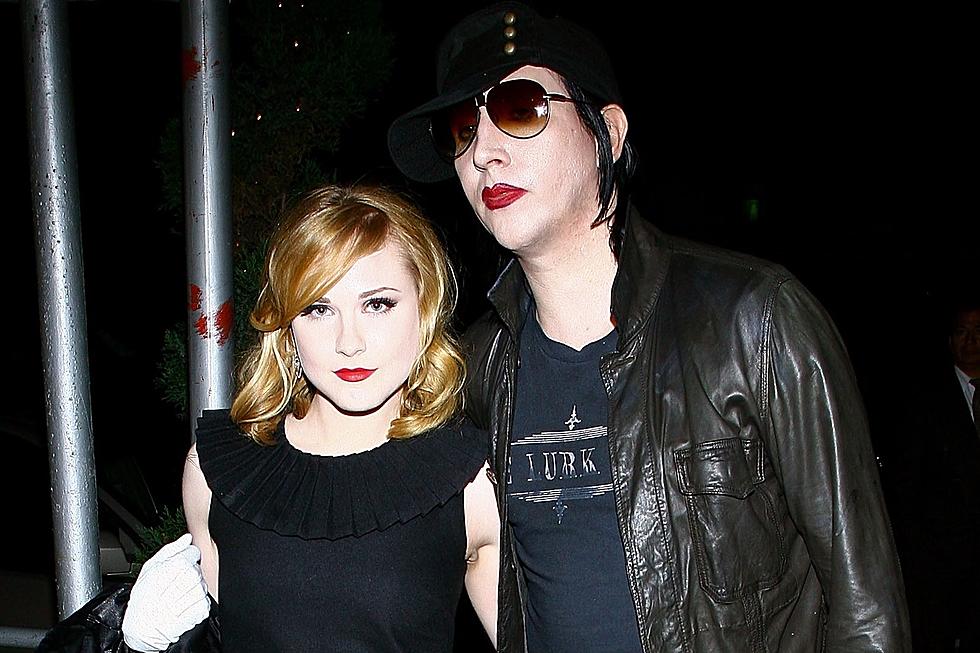
26 Years Ago: Marilyn Manson Issues ‘Portrait of an American Family’
Portrait of an American Family, the first album released by Marilyn Manson after he dropped the name Spooky Kids from the band's moniker, arrived on July 19, 1994. The effort proved to be a promising but rough-around-the-edges debut by the controversial and influential industrial metal artist.
Even though the references to White Zombie, Alice Cooper and Revolting Cocks are blatant and the songs lack the focus of his Manson's next album, 1996's Antichrist Superstar, Manson, with the support of Trent Reznor and his label Nothing, struck a chord with disenfranchised youth with Portrait of an American Family, who proudly wore t-shirts proclaiming the new metal messiah as the “God of F--- (Cake and Sodomy)." With the singles “Get Your Gunn,” “Lunchbox” and “Dope Hat” driving the record, Portrait of an American Family, retained a loyal fan base and eventually went gold.
Marilyn Manson, "Dope Hat"
While that paled in comparison the worldwide popularity of Antichrist Superstar, it started Marilyn Manson on his depraved and decadent path and marked his most self-destructive era. Inspired by volatile artists like Iggy Pop and Al Jourgensen, Manson used to bait the crowds, get into fights and cut his arms and chest onstage, but If the original version of The Manson Family Album had been released, the self-flagellation could have been worse. Okay, that's an exaggeration, but before Reznor took the reins as producer the album lacked the bite and burn to live up to Manson's onstage persona.
In July, 1993 Manson started working on the album with original producer Roli Mosimann at Criterial Studios in Miami. Using new material mixed with the most popular tracks from the Spooky Kids, the record was a mish-mash of content that didn't gel, even with samples. Mosimann strived for a sleazy, groove-laden sound that lacked the unhinged quality Manson was searching for. Manson was disappointed, as was Reznor, who saw the potential in the album and agreed to take over the production reins.
Along with re-recording the album, Manson fired guitarist Gidget Gein, whose drug problems were affecting his performance. Guitarist Daisy Berkowitz reworked the tracks with bassist Twiggy Ramirez, who played a major role in helping shape Mason's music until 2002, when he left the band after the tour for Holy Wood (In the Shadows of the Valley of Death). Ramirez returned in 2008 and remains an integral member of the band.
Reznor and Manson reworked the songs at the Record Plant in Los Angeles. This included hiring Nine Inch Nails keyboardist to retrack Sara Lee Lucas' drum parts on a drum machine. Finally, Manson changed the name of the album to Portrait of an American Family, which he felt more accurately represented the theme of the record -- the alienation, rage and toxic rebellion that lay within the fabric of a supposedly well-adjusted society.
Marilyn Manson, "Cake and Sodomy"
Manson reflected those ideas in songs like “Cake and Sodomy,” which takes aim at the hypocrisy of politicians, the decadence of public access television and the greed of religious icons. The semi-autobigraphical “Lunchbox,” is about a teenager who uses a metal lunchbox to retaliate against bullies. In the chorus, the protagonist sings about wanting to one day be a famous rock and roll star that gets respect from those who once picked on him. And “Get Your Gunn” is about abortionist David Gunn, who was murdered by a pro-life activist, who was later declared a martyr by the pro-life movement.
Marilyn Manson, "Get Your Gunn"
Elsewhere, Portrait of an American Family embraced pop culture, both frivolous and dark; “Misery Machine” is a reference to the TV show Scooby-Doo, which Manson was fascinated by in his youth, and “Wrapped in Plastic,” was influenced by the David Lynch television series Twin Peaks. The title is a direct reference to the imagery of the character Laura Palmer, who was murdered in the first episode, and whose body was wrapped in sheets of plastic when it was discovered. There are also lyrics in the song about the fear Manson experienced when he was in his grandfather's basement.
While Portrait of an American Family had its moments, the music lacked cohesion, the samples seemed unfocused and even after Reznor overhauled it the presentation seemed to have more bark than bite. The most significant aspect of the album was it solidified Manson's relationship with Reznor, which allowed the pair to record one of the best and most influential industrial metal albums, Antichrist Superstar, two years later.
Loudwire contributor Jon Wiederhorn is the author of Raising Hell: Backstage Tales From the Lives of Metal Legends, co-author of Louder Than Hell: The Definitive Oral History of Metal, as well as the co-author of Scott Ian’s autobiography, I’m the Man: The Story of That Guy From Anthrax, and Al Jourgensen’s autobiography, Ministry: The Lost Gospels According to Al Jourgensen and the Agnostic Front book My Riot! Grit, Guts and Glory.
10 Unforgettable Marilyn Manson Moments
Marilyn Manson Albums Ranked
More From Sasquatch 107.7 - The Rock of Rochester










